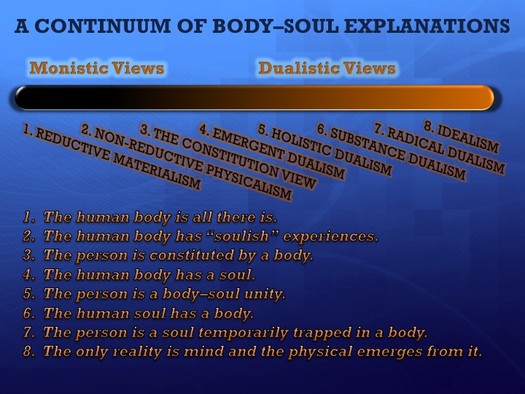Do you have a soul? What does that mean? Is it even a good question? It’s certainly close to being a good question. Personally, I think the question is not so much “have I a soul?” but “am I a soul?” A soul is fairly easy to define as a centre of consciousness or better still as a simple centre of conscious power. If you are a soul you will have a first-person perspective on the world; you can be the centre of a wide set of experiences, thoughts, desires, and beliefs. You can experience your surrounding from a variety of perspectives (focusing on sights, then sounds, then feelings, then changing your location and beginning the process all over again).
The first thing to note is that concious experience is radically different from anything in our brains and nervous systems, which are open to “third person, public” observation and measurement. Your first-person awareness of the world cannot be observed or fully known by anyone but you. Furthermore, our experiences cannot be quantified or measured. Many cannot be adequately captured by art or literature; so pity the fool who tries to devise a unit for measuring melancholy or joy!
 In every conscious moment we aware of numerous, irreducibly different states of affairs. I can be simultaneously aware of the location of my body, the colors on a computer screen, a pain in my lower back, the smell of coffee, a sweet taste, beliefs about the nature of consciousness, a decision to type something about these beliefs, a desire to write something meaningful, frustration at my lack of progress and much else besides. I am also aware that I am self-aware. I experience that I have all these experiences. Which means that I am not identical to the experiences – there is one “experiencer”, namely me. I don’t infer this, or perceive it as a datum, or postulate it as a good explanation. I’m just basically aware that I’m the centre of all these experiences and thoughts. We can remember past experiences – and, as Thomas Reid (1710-1796) pointed out, our memories are not subjectless. We do not merely recall the fact that a certain event happened to us; we remember our experiences from our own subjective perspective. Every memory includes a reference to the “I” who is remembering.
In every conscious moment we aware of numerous, irreducibly different states of affairs. I can be simultaneously aware of the location of my body, the colors on a computer screen, a pain in my lower back, the smell of coffee, a sweet taste, beliefs about the nature of consciousness, a decision to type something about these beliefs, a desire to write something meaningful, frustration at my lack of progress and much else besides. I am also aware that I am self-aware. I experience that I have all these experiences. Which means that I am not identical to the experiences – there is one “experiencer”, namely me. I don’t infer this, or perceive it as a datum, or postulate it as a good explanation. I’m just basically aware that I’m the centre of all these experiences and thoughts. We can remember past experiences – and, as Thomas Reid (1710-1796) pointed out, our memories are not subjectless. We do not merely recall the fact that a certain event happened to us; we remember our experiences from our own subjective perspective. Every memory includes a reference to the “I” who is remembering.
As Thomas Reid explained:
I am not thought, I am not action, I am not feeling; I am something that thinks and acts and suffers. My thoughts and actions and feelings change every moment – that have no continued, but a successive, existence; but that self, or I, to which they belong is permanent …”
Also note that we experience a multitude of sensations and thoughts as one fact. We have “unity of consciousness”: I am one subject who co-experiences various sensations, beliefs, desires and thoughts all at once. The brain processes a scene when populations of sensory cells cut it into chunks of information that can processed by millions and millions of cells deep in the cortex. Yet we do not experience numerous interacting parts; instead we experience one coherent image. This image is so rich that one artist could render one scene in numerous styles and still not exhaust everything that he had been aware of. We can dissect nerves and brains into their various spatial parts; yet, while we can direct our attention to one part of our stream of consciousness, we cannot dissect our awareness for study. The qualities that characterise experience (like sensation and intentionality) are not the properties that characterise physical parts (like mass and energy).
It seems that our unity of consciousness cannot be identical to anything in the physical world. It is true that we can surprised when two seemingly unrelated events or objects turn out to be identical. A medieval astronomer might have speculated that the evening star and morning star were in fact the same heavenly body; a good mystery writer can have his amnesiac protagonist discover that he is the murderer. But we can see how a detective could be a murderer, and how different lights in the sky could be caused by one planet. The properties essential to being a unified conscious experience and the properties essential to being a physical system are so radically different they simply cannot be the same thing.
 Agent explanations are conceptually clear, philosophically illuminating and practically useful: this should incline us to believe that we are souls and not merely physical bodies. Agent explanations differ in nature from scientific explanations. In a scientific explanation of personal actions, events in the person’s brain cause the person to act. The person is passive in these explanations– physical events in the brain do all the causal work[1]. But in an teleological explanation the person is active, not passive. The person assesses his desires and beliefs and then makes an undetermined choice for a particular purpose.
Agent explanations are conceptually clear, philosophically illuminating and practically useful: this should incline us to believe that we are souls and not merely physical bodies. Agent explanations differ in nature from scientific explanations. In a scientific explanation of personal actions, events in the person’s brain cause the person to act. The person is passive in these explanations– physical events in the brain do all the causal work[1]. But in an teleological explanation the person is active, not passive. The person assesses his desires and beliefs and then makes an undetermined choice for a particular purpose.
In a teleological explanation a person’s choice is not dictated by events that occur in the brain or the environment. The agent is free to choose from a course of action. So the agent must have a power to choose in a teleological explanation. For teleological explanations to be true, there must more to us than the physical parts that make up our bodies; we must have non-physical minds that have some level of control over our actions. Otherwise we would not be able to escape the chain of physical causes and effects. Free-will would be an illusion in such a world – yet we experience ourselves as free agents, and a robust account of moral responsibility demands that we have such freedom.
A third argument concludes that we must have a substantial non-material part because we are rational beings. Materialism assumes that the physical world is causally closed: every physical event has another physical event as its sufficient cause. When we explain physical events (such as events in the brain or the human body) we should only appeal to physical forces, physical objects and the laws that govern them. We would be able to fully explain the words and actions of humans merely by appealing to the operation of the brains physical parts. This has an unusual consequence – we do not need to appeal to any event in a human’s subjective consciousness to explain their actions or words!
Even if some physical events are somehow identical with mental events (and it is impossible to see how this could be so) it is the physical structure of the events in the brain that will determine what we report and how we act. The psychological and conceptual content of an experience has no causal power at all; remember, the materialist believes that a chain of physical cause and effects governs all our behaviour. On materialism, the processes in my brain are the contingent outcome of evolution by natural selection. This process did not aim at true belief – it merely favoured brain events that promoted survival and reproduction.
Psychologists have routinely tried to demonstrate that certain beliefs are not rational because they are produced by causal chains that are not aimed at truth. For example, Freud argued that our belief in God and the beliefs produced by conscience are not rational. So, if I hold beliefs simply because the molecules in my brain have interacted in a certain manner, I have good reason to doubt my beliefs.But this can’t be right! Surely when I accept the rationality of a belief, it is because I grasp that belief’s content and the connection between that belief and other beliefs.
Evolution gives little comfort to the materialist here: on materialism, the course of our evolution was not designed. Natural selection will only promote adaptive behaviour, not true belief. Evolution can only select for behaviour which enhances chances of an organism’s genes being widely represented in the next and subsequent generations. So the evolutionary process responsible for creating human cognitive faculties was not likely to filter out unreliable cognitive faculties: therefore we cannot trust the beliefs produced by our cognitive faculties; and one of the beliefs produced by our cognitive faculties, of course, is the belief that our cognitive faculties are reliable.
Of course, this is not an argument against evolution or even for theism. It merely establishes that materialism cannot give an adequate account of rationality because it cannot explain why our beliefs can match reality. If we are rational then mental events – like beliefs and decisions – must be able to cause some events in the physical world; mental content cannot be irrelevant to behaviour. Rationality also demands that we are substantial selves that persist through time. A rational inference is not the output of a chain of non-rational events in a physical system. To make a good inference one subjective awareness must grasp the content of numerous beliefs and the rational connections between them.
All causality is mysterious, and so it should not concern us that the interaction of an immaterial mind (the soul) and a material body seems puzzling. As Alexander Pruss notes
Yes, it is very mysterious how a non-physical cause could have a physical effect. But (at least given a non-deterministic physics like quantum mechanics) it is no more mysterious than how any cause could have an effect. Sir Isaac Newton said that the sun has a gravitational effect on distant planets. Philosophers wondered: How could that be? Certainly such causation at a distance is mysterious, but it is not just a thing’s being at a distance that makes it mysterious—it iscausation that is a mysterious tie between distinct events. How can one thing cause another? That is the mystery of causation, but it is no more puzzling when one of the things is physical and the other is non-physical than when they are both physical….Science is full of things that are “very different” interacting causally with one another. Indeed, naturalists think that non-living matter can cause life, and non-conscious matter can cause consciousness.
Once we have comprehended the sheer weirdness of the quantum world, it is rather easy to accept bodies could interact with immaterial minds. Certainly, there is nothing in contemporary physics that demands that the propensities of particles be actualized by other physical objects. If the soul has causal power, the capacity of a micro-particle to act in a certain way could be actualized by an immaterial mind. Science might not find the idea of a rational, purposive, immaterial substance very respectable. But modern physics has taught us that reality is not that bothered by what we find respectable. The truth will often be stranger than atheist fictions.
The soul is not an hypothesis that attempts to account for scientific observations. Plato, Augustine, Descartes, Butler and Reid merely reported what they were directly acquainted with when they reflected on their own conscious experience. They just seemed to be – and we seem to be – enduring, rational selves. If we are mistaken about the deep matters of the self, it is difficult to see how we could depend on any other observation. Materialism struggles to account for our first person experience because it must explain this evidence away.


